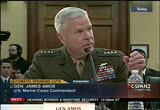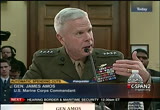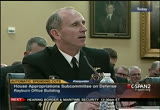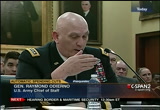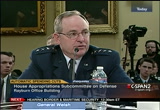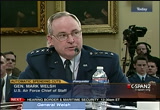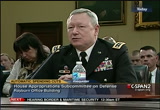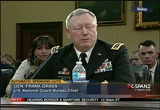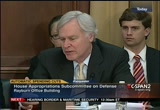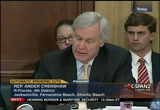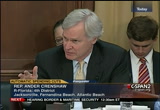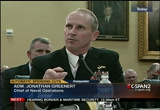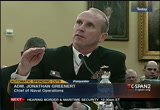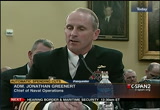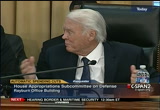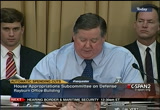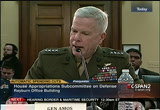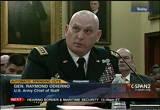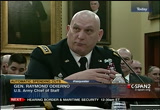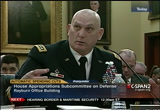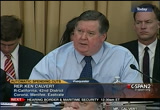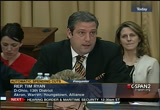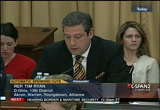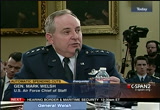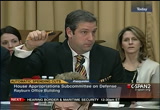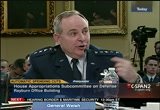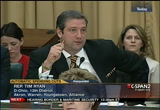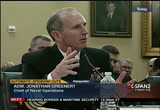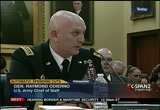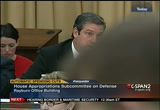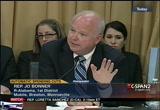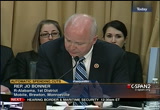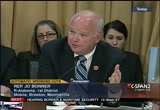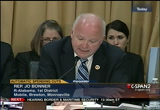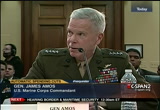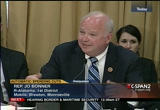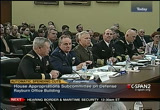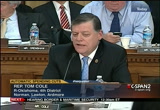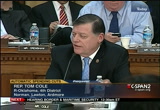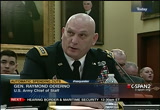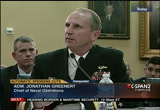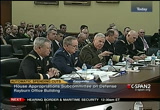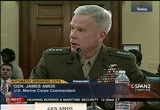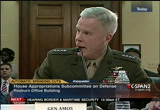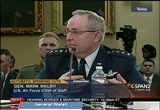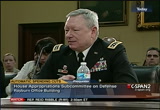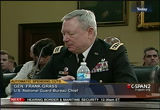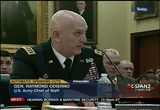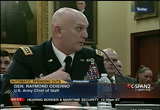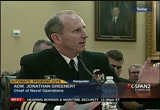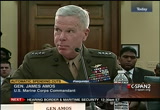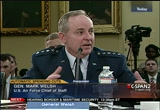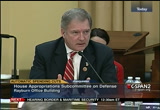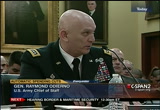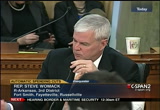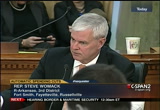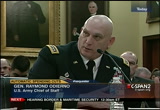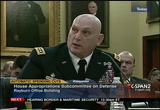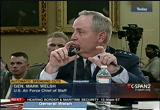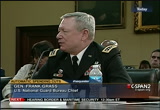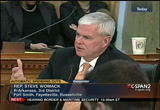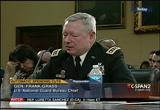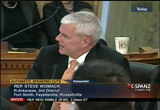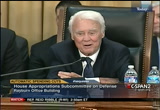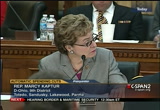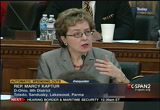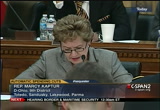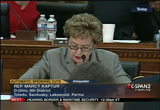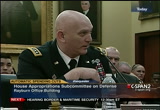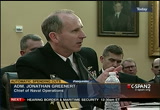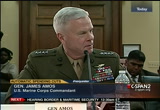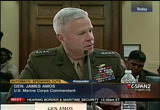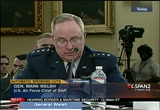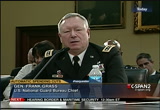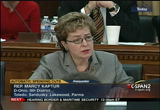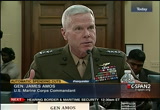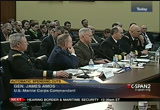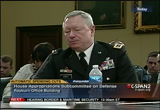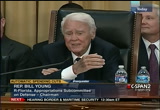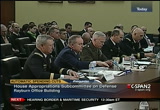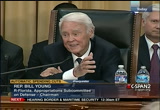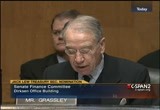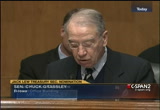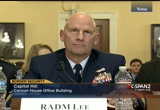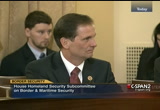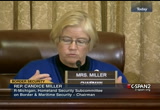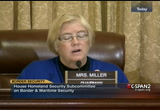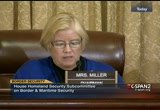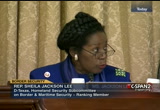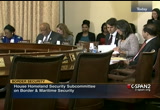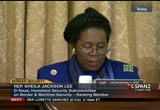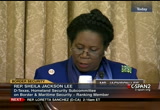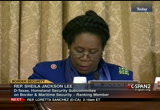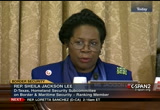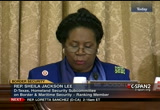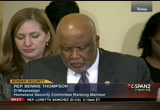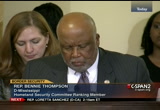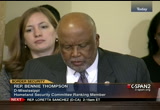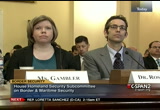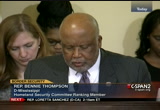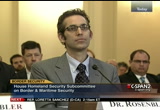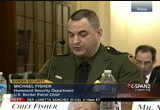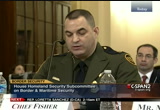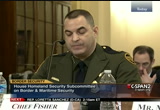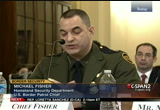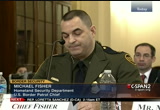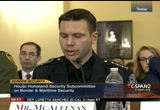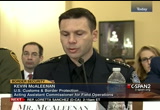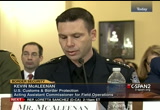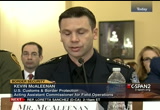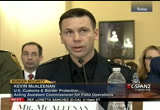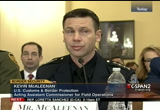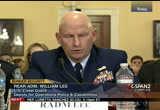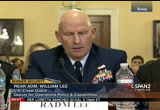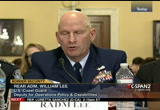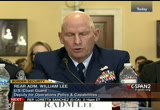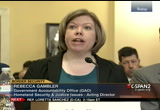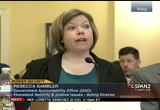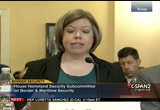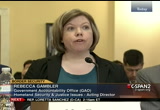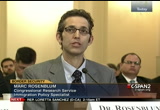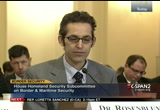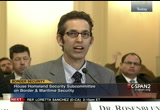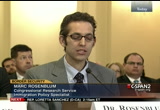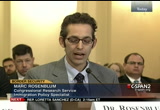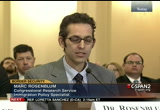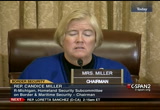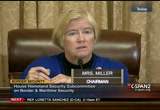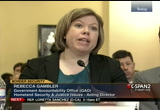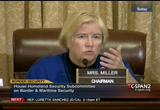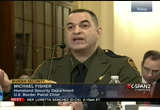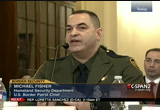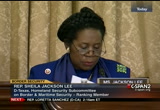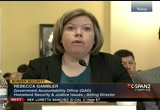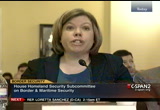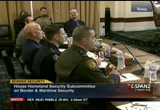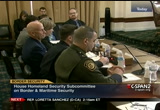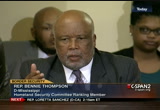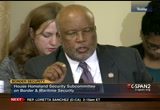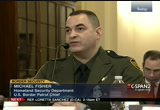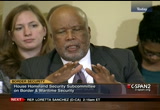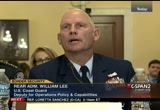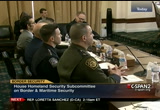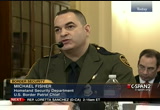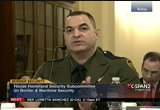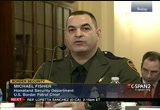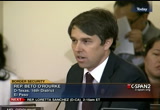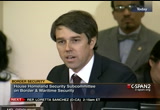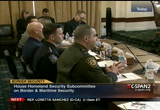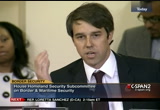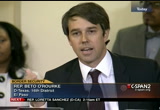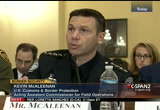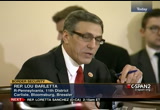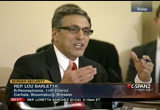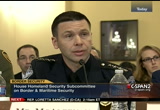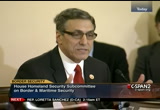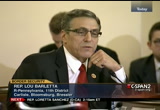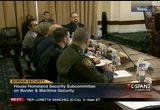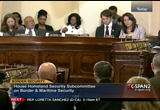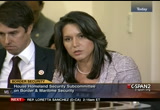tv Capital News Today CSPAN February 26, 2013 11:00pm-2:00am EST
11:00 pm
sailors that return back from combat. our civilians we have hired in the last year and a half as a result of an emphasis to eradicate assault, and is wholly qualified individuals part of our team now are all eligible for what will happen shortly. it will be a 20% reduction in child care workers, mental health providers, teachers at schools on basis, not a lot, but we have some. so it is going to impact bat. the hours are going to reduce, showed cosigners if the base has five of them, two of them may close. i mean, those are the kinds of impacts that are going to have been.
11:02 pm
11:03 pm
11:04 pm
airmen, marines, guardsmen, we talk about the impact on the families all the things that are important to our people. a the problem is that 31.5 million man-hours overload workforce is awfully tough to mitigate. that is where we need help. we cannot control that. now, the other thing that i mentioned is that the workforce is someone else we should have been keeping track of. they haven't had pay raises. now we are going to take 20% of the fiscal payraise. this is an important part of what we do, not just in this active department, but in the guard and reserve as well.
11:05 pm
i have been to a number of air force installations and there have been air force calls up an entire baby's population. the entire question, every single one of them is about sequestration. every single time. they are paying attention and we know that there is an impact coming we just don't know how it affects them congressmen. >> many those numbers serve as well. they're probably talking about
11:06 pm
the military technicians and back to the video assignment and the armories where they serve in a civilian capacity. they could be faced with losing homes and cars within months. we are watching very closely and trying to reach out to some of the support organizations and make sure that they have that help in place when they i do return. more for the long-term, we rely heavily, especially since this has been going on with mental health professionals that we put into the state grid helping people that are on their second, third, fourth deployment. not only just the servicemen,
11:07 pm
but the families. if you look at full sequestration, you look at tens of thousands of veterans coming back to their home towns. their communities. that help will not be there for them some will come home and there will be anything there for them. >> okay. >> thank you, mr. chairman. i would like to ask you about something that is maybe not as glamorous, maybe not as outfront, and that is the maintenance part of this equation. i have heard you all talk about maintenance and operations in men and women in all of these very important things. things like maintenance is something that is always kind of in the background.
11:08 pm
whether its planes or tanks, there is no area that will be exempt from that. the general talked about a hollow military. it seems like that is the first that to holler out the military. neglecting maintenance. it has happened from time to time in our history. i know in my district, they decided to cancel about $200 million worth of maintenance contracts. i believe what the navy has said, if we go along with the sequester and the continuing resolution build, i think that one of the reasons that happens, as i have read, it is less visible, and also considered to be the most reversible. in other words, you can skip the maintenance because you can always make it up when it came
11:09 pm
time to deploy for the gulf war, because they have skipped maintenance after maintenance, it could not deploy. they rushed and then finally, they decided that they would just decommissioned decommission the carrier. still adding about 15 years of life. which is cheaper than decommissioning of because of all of the lack of maintenance that has taken place. so it seems to me, and maybe i will direct us to the navy, because the numbers matter in the navy. obviously it is a lot of great people. we have half as many chips as we had 30 years ago. some people say that that is okay because they are technologically advanced we
11:10 pm
don't need as many. which i am sure that that is true in part. but it does seem like numbers matter to a certain extent. that is the thrust of my question. we are asking you, the navy, to do a lot of things. to go and chase the pirates off the coast of samarra. we are asking you to send humanitarian aid from the caribbean and citizen destroyers and we will need to keep an eye on china as well. it seems like the world has not gotten safer. the question to the navy and the other services, three simple questions. how do you decide the priorities that you are asked by the combatant commanders. these different missions.
11:11 pm
how do you make that decision in terms i priority when you only have limited access? also, are there areas of the world where cousins will be decreased because of this? and also, most importantly, what impact does this have on our national security and global security securities well? if you could address those and if anyone else would like to address it as well. >> the decision as to where we go is a debate, if you will, that we had with the joint staff and the secretary of defense. the outcome of that is my signal. this is what i have to to provide. it is called a global force management and allocation plan. it's where we distribute naval assets. what i've written, i have to be where the maritime crossroads are. that is in the strait of hormuz and the arabian gulf and the
11:12 pm
western pacific and down by the straits of malacca. so we decide that and lay that out. that is my signal. whenever there is a reduction in the budget like we have today, we say what is the priority? we go to the defense that was laid out. we balance it in the asia pacific, but the mideast is extremely important today. that is where a lot of energy and product is. we balance the two. but my point you is that it is a conversation with the secretary of defense and combatant commanders as well as the chief of staff. so that is kind of the area. the impact of what happens now, i have a $.6 million in deficit, if you will, in my operations account. well, what will happen is we will keep the gulf in our present and most of the
11:13 pm
combatants are there today. fortunately, in the asia pacific, we have 40 ships that are out there day in and day out. that is the advantage of operating forward. those ships were already there. they were in japan, they were guam and singapore. those ships will remain there. but the problem is, as you said, if we don't do maintenance, what happens then? well, there is a debilitating effect and he laid it out clearly. you have to change this back sooner or later. you see examples of the congressmen and we should've done that before for $2 million, now we are doing it for $24 million. so it is a debate at the level of the department and a cherry decision was an outcome of a similar debate as to where we go. we will reduce presence in the central command by one carrier right now in a couple of
11:14 pm
destroyers. we will reduce it and we won't have any ships at the end of the year. that is constantly interjected last year, but i guess we won't be part of this year. in african command, we will only have a couple down there. terrorism, pirates of the mentioned before, similar story in the european command, again, the we have a number of ships there. but we still aren't supplementing them with destroyers -- missile-defense destroyers. we can help reconcile this if we can get some funding mechanism. >> thank you, sir. >> in the interest of trying to give a fair balance here, i'm going to move on to another one on this side. so let me go to mr. ken calvert. >> thank you, mr. chairman.
11:15 pm
good morning and thank you all for your service and leadership. and also the enormous impact that our budgets are operating under. i would never ask this to cost me more money, it is the product that is a national defense. we do have enhanced programming authority. we understand that the defense budget agrees to in the budget control act, it will remain in
11:16 pm
effect. what specifically would you cut in order to ensure that the service is able to be as effective as possible? >> congressman, the client structure -- it is a current structure of absent sequestration. coming down to 182,000. it is purpose built for the strategy that the president has put in force a little over a year ago. the strategy that we all worked on. i cannot do that based on the current strategy. what is going to have to happen with this sequestration is that
11:17 pm
we will likely have to go back in and revisit that strategy. i'm not strategy proficient, so what is the piece that i? what are we going in and changing? we have this strategy that is driven. we don't know what the future is going to hold with regard to the strategy. >> congressman, with the budget control act, we develop a strategy that was in line with the numbers that came out in the budget control act. it is such a thing that allows us to provide the capabilities needed to meet the defense
11:18 pm
strategy. if we get additional cuts, sequestration specifically in this case, i am talking about, 40% of the armed budget is in people. the bottom line is that in order to maintain that balance, it will have to be the reduction of people. military and civilians. so we are going to have to figure out what is the right balance. again between the readiness and the modernization. what this will mean to us is reduction in capacity. so although we are confident we can meet the new strategy with the budget control act numbers, i believe that is the lamest just said, we will be significantly challenged me to strategy with the sequestration. so we're probably going to have to do a review of the new strategy. that will be the impact on us. it is our ability to respond, whether it be in the middle east or not. if we are not ready, we put our soldiers at risk, that is why we have to sustain the balanced.
11:19 pm
>> thank you. one other concern that i also have is in the acquisitions process. obviously, we all want to save the government money. but i expect sequestration has the potential to cost far more in the long term when you look at it contract by contract. can you give us an idea of what we are likely to see on this acquisitions process, what mechanisms are causing these overruns, and how much -- how much approximately do we need to spend as a result of sequestration? holding up these contracts, restarting these contracts. >> if i could, i cannot give you the specific numbers, but i can talk about a few things. what we are having to do is stretch out every one of our programs. what is going to happen is it will cost more per item, whether it be an apache helicopter, whether it be another
11:20 pm
helicopter, whatever system over time and the cost becomes more inefficient. that is the only way we can do it. especially if we want to sustain these modernization programs that are necessary. multi-year contracts. okay, so one of the problems is that we can do multi-year contracts. for example, we have multiyear contracts with these helicopters are issued. what will now cost us a little money in order to execute this program, for example. >> i know you have enough problems in the acquisition process already. without having a sequestration problem of honey. but if all of you to give a report to the committee on any additional costs and the acquisitions process, that would be helpful.
11:21 pm
and while you are at it, the acquisition process has been pragmatic over the past. any changes that you can suggest, it can help keep the costs more manageable in the future. >> thank you, mr. chairman. >> thank you, mr. chairman. thank you, gentlemen. this is a reality type of hearing what reality is coming home. i would just like to think the general board this program and the first marine expeditionary force and what they are doing with the training institute, it is an amazing program that i have been working closely with and i think it's something that can help build a level of resiliency that we need in our troops. to prevent them from
11:22 pm
experiencing the kind of trauma, the trauma that they encounter in the very early stages. a wonderful program, i look forward to continuing to work with you, given these young men and women, giving them the skills that they need with these complex and stressful situations and deal with it in a way that can prevent a lot of mishaps we all end up dealing with. so i'd like to thank you so much for your leadership there. the general for his leadership as well. general welch, i have a lot of numbers of the air force in my congressional district and you hit a nerve when he said -- when he started talking about the reduction in flying hours, the flying hours lost, scaling back training, up to two thirds. and what really hit me was that we will be non-machine on transmission capable by july. then it would take six months or
11:23 pm
more for us to turn back to full capabilities. so can you just make that point again? can you let us know in the taxpayer know what kind of cost we will have to get our men and women back to mission capable? >> yes, congressman. this is a part of the air force. the problem that we had is that after we set aside the forces are committed to supporting operations in afghanistan, other named operations, other things, those that need to maintain a level of readiness, we are just running out of flying hours. and as long as we can stretch the money out.
11:24 pm
this will be beginning in march. sixty days later, for most of our pilots, the pilots themselves will be mission ready, and by july, the unit itself. that is what i am referring to. when we start the next fiscal year, assuming that we have the right amount of flying hours to keep those continuously ready, that is not going to be enough to recover the readiness. we will need more flying hours next year to bring them back up to speed, which will take more training, more demand from instructor and evaluator time, it will take about six months to return the force readiness and it will have cost some increment, we are working the number now a bubble we already have on the program for flying hours for next year. >> if we are not mission capable by july, further out there we go, the worse it gets? is six months the number to get them back to mission capable?
11:25 pm
or does that number -- does that length of time it longer the longer they are out? >> it gets longer the longer we go. >> as we ride this thing out until next year -- you're talking about a good number across the military of training and i just think this is a really important point. the longer that this goes, the more complicated it gets. the more expensive it gets. and the less ready and prepared that we are. >> exactly, congressman. and the higher the risk. i think it is important for all of us to understand that if there is a contingency that occurs, it is beyond what we are offering now. it is not that the nation is not going to respond. the risk goes up because our force will not be as ready as
11:26 pm
they would be otherwise. that is our concern. >> with the reductions that are going to be made, putting us at further risk. the one issue, and i hope this committee, i hope this is an appropriate question on cyberterrorism. my real concern is that as we go through this, we are still going to be able to maintain what we are doing with regards to cybersecurity. reading the paper and we, as americans, are realizing how active and engaged a lot of people are, banking system, military, the government, our financial institutions, so anyone who is feeling the spirit to address that issue on maintaining that capability as we go through this budget process.
11:27 pm
>> could i make a quick comment. i would like to talk about this. one of the things that is important, a critical piece of our structure that we have talked about, 40% of our cyberwar curse -- the furlough affects the capability beginning the first day. our ships and our aircraft are instances of cider. they deliver cyberattacks. if they are not out and about and ready, then what you are losing is arrows in the quiver. quiver itself, that is cyberheadquarters, we are doing everything that we can to horrid money to keep out where it needs to be. to keep them ready. i am okay with that. time is so critical here. as you mentioned before, every month that goes by, we lose opportunities to train.
11:28 pm
but it is also between cyberand it is harder and harder to get up that hill. >> we are, as we downsize and increase, i think that we are increasing the number of people and we are starting to train additional people now. that has become one of our very top priorities, to make sure that we have developed our priorities due to the potential threat of the nation. we have identified that as a key component of future strategies, but it is at a cost. we have to find it is important right now that that is one of our priorities, continue to increased our investment in that
11:29 pm
even with the sequestration? >> yes. we are moving forward with increasing our investment. because of the criticality, we believe it is necessary in order to protect ourselves. >> that there should be more than increased without sequestration? >> i cannot answer that right now. i think what will happen right now is we have agreed to do this. at the time we agreed to this increase, we were not sure that sequestration was going to happen. sequestration will delay but not eliminate the implementation. >> the mechanism of sequestration, it goes to every single person of personnel. but if we have the means to reallocate money, we can get that priority program. >> even if there is an increase, it will still be effective. >> that is right.
11:30 pm
the limits are cyberoptions. they are instruments of cyberas well as other things. in our world, that is an impact. >> thank you, that is my concern, mr. chairman. if something happens here, they are going to look at us and say, what were you all doing? >> that is a very good question. >> thank you, sir. >> thank you, mr. chairman. gentlemen, i was at camp pendleton a few days ago. one of the generals there, i won't call him by name, but he was echoing the concern that mr. cutshall raised about the maintenance issue. his analogy is one that many americans can understand. if you go out and buy a new car today, if you don't change the oil on it, you can probably run
11:31 pm
it through three or four years and it will be -- it will still run. the longer you own it, the more expensive it is. we all know this to some degree. i would like to ask, correct me if i am mistaken, but the information is first testimony goes, we are currently talking about the third and fourth quarters of this fiscal year, and that would mean as it was scheduled for maintenance, and it would not be included in the repair facility. if i am correct, i guess the question is, given that there would be no direct impact, did you consider, and i know that this is the small changed the
11:32 pm
build ends the you're talking about, but what about the induction of the uss enterprise ? did you consider that as part of your budget considerations? >> yes, we did, congressman. if we can get the authority, that is certainly something that the secretary and i would like to talk about. split funding, if you will. the reason we ask this, we will check it out. it is a lost opportunity when you get it back. >> that goes to my second and last question, i'm sure many of us understand. in many ways you have painted a grim picture. we have seen this and other parts of the country. you are preaching to the choir. we are distressed and concerned about the impacts as chairman
11:33 pm
rogers outlined. a solution that we are trying to work. we don't know whether we can get it done. we don't know what the senate will do. we really don't even know what the president will do. we voted for the budget control act, as someday, or you are the president who signed it into law, whether you or any of those, we all have a responsibility. the devil continue to go up and the impact on the nation. and in the position, i guess the question i would have, and i'm not trying to throw you into political discussion here, but respectfully, given what we have discussed today, given the consensus that you would like and i think most of you, you have indicated that we would like to get that to you. is there anything you could recommend to the commander in chief that he could give or do
11:34 pm
to minimize the effects of sequestration? anything that can be done to help in a continuing resolution or some type of instrument to have the balance of this fiscal year to give you the flexibility that you are asking for that many of us would like you to have. >> congressman, our commander-in-chief has made it clear personally, especially in front of me that he does not support this and he wants to do everything that he can to avoid sequestration. without getting into the political parties here, that is what i see. i do not have the benefit of the
11:35 pm
day-to-day interactions, but that is what i see, that is what i have seen in the press as of late. our president doesn't want this and he understands the impact. so that is the firsthand knowledge. >> general, i am not disputing it. i am just saying that i haven't met a single member of congress, democrat or republican, the likes of sequestration. and taking your assessment, taking the presidents were, he doesn't like sequestration, you do not like sequestration. i doubt that anyone likes of sequestration, yet it is upon us. you may have an opportunity. we passed legislation, but in order for it to be signed into law, it takes both branches of government to work hand-in-hand on that. i would welcome any input you
11:36 pm
could offer through the chain of command, the secretary of defense, and he has articulated this well. but i do think that we all bear some responsibility to try to avoid the devastation that you are presenting to us today. >> going back to what the general said, and i agree with him, we went to great pains working with the secretary of defense to make sure that the president understood the impact of sequestration. together, they are very debilitating. so i would just share that i am unaware of an executive order and the continuing resolution. >> thank you, mr. chairman. >> thank you, mr. chairman, thank you, gentlemen, for your service. i would be remiss if i did not
11:37 pm
extend general mcdonald's one regards to ray odierno. we have talked a lot about the damages, obviously that sequestration has inflicted upon the force. i would like to pull you back a little bit and ask each of you to think strategically and globally about what the impact this has for the country and its ability to project and preserve stability around the world. general welch, your predecessor described with great pride with the air force had accomplished in iraq and afghanistan and on the fly in libya, the extensive operations have gone on to help our friends in japan and their prices. given the cuts of last year that we were talking about, will you
11:38 pm
be able to do that again in two years? you said no, we might be able to do two or 2.5 or maybe three, but we certainly can't do all things again because we won't have the capability to do that. now, we are talking about something on top of that. i would like each of you to tell us insofar as you can do things he won't be able to do that we take for granted because you have done it so well for so many decades. one last point, then i am ready for the response, great work by a guy named robert kagan, absolutely a terrific read about the extraordinary things united states of america has accomplished since the second world war, and how we are all more secure. not just as americans, but moving probably in the right direction, open markets, good things. and it credits the american military with that. it has been the great maintainer
11:39 pm
of peace. not just the winner of awards, but the maintainer of peace. so again, we are going to diminish that capability pretty substantially. again, if you could tell us some of the things that you will not be able to do, we are used to you being able to do this without our part. >> burst, one of the things that i talked a lot about was what you just mentioned, preventing preventing conflict, providing the capabilities to shape the operational environment that allows them to prevent conflict in the future. we will not be able to support them in the same level that we do today is sequestration goes into effect. the other thing that we lose its capacity. when we do that, we lose capability to deter. if people don't think that you can respond to a small number of
11:40 pm
contingencies -- that is what i look at. it is about having the right capacity that will deter others from making miscalculations. so what i worry about, as we move down the sequestration numbers, do we move below a number that no longer deters our adversaries or others that might miscalculate and have an impact on our insecurity. that is one of the things that i worry about. >> as i was talking to the congressman earlier. i laid out the global forest management allocations, and that is our work in the department of defense from the navy's perspective and the marine corps to be where it matters and when it matters greatly to be there right away. the second piece is to be able to respond with this out there. to be able to get strike groups and their.
11:41 pm
we were able in the last three years to have pre-strike forces ready to go within 30 days. we are going to be down to just one able to serve. the rest will not be ready. half of that 10 are not effective. that is a new world for us. whatever mechanisms that can put in place, we are out of balance with operations. we have to get that back during the forces that we have come, the readiness that we have to respond. it won't be like this, it will be less than central command and less in the western perspective pacific. that is midrise. >> congressman, right now today, we have cancel our exercises in the southern command of central and south america. we canceled our noor khan
11:42 pm
exercises and reduced 30% in the pacific and yet that is the area in our nation is elected. that is some of the near-term impacts. for us as a navy marine corps team, we are hedging against some uncertainty. we are forward engaged. we don't know what the world is going to unfold out there. when you buy an insurance policy, health or life, or a hedge against the unknown, that is what it is. that is what the force is due. we are out there, we are engaged, we are building partnerships, relationships and relationships count. we won't be able to do that to the degree that we are doing it today. i have a host of things since 2010 but the marines and the navy have done. i won't go through that with you. specific things i could take
11:43 pm
down. the pakistani flood believes, the operations in northern japan to help our friends and allies after the terrible earthquake and tsunami. the philippines, haiti, combat operations in afghanistan. we are going to be limited on what we will be able to do. this time next year, we will not have deployed two marine expeditionary units, that is the navy marine corps team, 5000 marines and sailors. out there dealing with the operations around the world. we will be able to do that. last point i would make is when things happen around the world, and we need to be globally engaged in leaving as a nation, we have always built those relationships. you cannot surge trust in the middle of the a crisis. you can try. but it's very difficult. last, we are a global nation of
11:44 pm
leaders. we have a responsibility and that will be severely affected. >> congressman, the air force provides vigilant power for the nation. that is what we offer. in support of our services, sometimes it results in the sport of our own decisions. the abrupt and arbitrary nature of these cuts come at a sequestration, it has affected our ability to do that already. the sequestration takes effect and it will have a dramatic impact on those areas, except the ones we are prioritizing because of the current contingency. strategically, the congressman referred to this earlier. there will be a decrease presence over time. quantity does have a quality on its own. i do not care how far away the platform is. it applies to all of our services. impact on national security is pretty simple. it limits options.
11:45 pm
the nation has to decide what option wants to preserve. it is not our decision, we just execute the decision. finally, i am concerned that strategically with our ability to connect with the american people over time. we already have difficulty with that because of the lower number of people who have served on a voluntary force. that will get worse if more military infrastructure units get smaller or services get smaller. in that connection to the mainstream of america will be tougher to maintain over time. that could affect the quality of the force that we have now, and that would be catastrophic. >> congressman? we have a dual mission to artman and support the air force and the governors and the states. if we go back before 2001, many arguments were probably at about
11:46 pm
one third what they were expected to be. because of the investment by the army and the air force and the guard today is much better than not. we can deploy a lot quicker. i am very much concerned that with full sequestration we will go back to that more strategic reserve at a time and nation can't take risks and not strategic reserve because the active forces will not be as modern and ready if needed. on the homeland side, we are just now getting to a point with dhs, working very closely, looking at how we respond to complex catastrophes. a 7.0 earthquake. we are not ready for those things today. we are making plans, we are working, we are looking at the quintessential capabilities that we needed those times. this will set us back. >> thank you, mr. chairman.
11:47 pm
>> mr. owens? >> thank you, mr. chairman. i would like to go back to a topic that is being debated to some extent throughout the hearing. that is the reallocation and the reprogramming. each of you seem to call upon that something you would like to have. is that a short-term strategy? if i realloc weight and reprogram this? does that put me further in the hole next year? if so, what steps you take to deal with that? >> congressman, what i would say is there is a short-term reprogramming issue but in reality, what we need is -- we need to develop a long-term plan together. so far we have not been able to do that because we have not had budgets passed to do this. i worry about that. with reduced resources, we have to be able to make the most out
11:48 pm
of what we have. if we do not get appropriations. if we do not get the appropriate authorizations, we are not able to do a plan that allows us to make the best use of the dollars available for us to build a program for our services. as we look at how we want to build the army with reduced resources. we haven't been able to do that yet. it is starting to be a concern to me. i am worried because of the problems we are having with arguments over sequestration and other things, if we don't get a 2014 budget, we are right where we were this year next year. we have wasted another year, we are spending more money, we are not able to plan properly and do the things that we think are necessary. that is what i worry about. >> in terms of those reprogramming, if you have the
11:49 pm
ability to do that today, that still does not resolve the long-term problem of building a plan based upon a reduced budget. >> it only serves one third of my problem is here. that is 6 billion of the 18. >> okay, congressman, i am out of balance. having a $.6 billion shortfall operation with half the year to reconcile that. in the investment accounts, i have money because it carried over. step one, we need to get balance. that is one mechanism. number two, time is so critical because every month that we have reduced the burn rate, if you will, it's an opportunity lost. as we talked about maintenance, babel, around on the road.
11:50 pm
there is a time element, there is a balanced element. once we can get that taken care of, as the general said, we can focus on whatever direction we need for fiscal level is. we just need to be clear on what that might be a. >> congressman, everything that my two colleagues have said pertains to my sense and piece of the world as well. a short answer to your question, absolutely it is right. i am taking money out of facilities maintenance, congress has been generous enough to give me about $3 billion worth of reconstruction over the last seven or eight years. we have moved into the best barracks the marines have had since 1946. the maintenance of those facilities is pretty important to me. we are taking money out of the maintenance of those facilities, the idea of a car, running up to
11:51 pm
three years, that's exactly what's going to happen. there is a piece of the risk that you are absolutely right about. i am harvesting money at a deeper level maintenance, aviation, ground equipment, so that i can pay for readiness. but it is important for me right now. that is what we do for our nation to be ready. but you're absolutely right. >> we have deferred projects because we do not have the right money and it doesn't allow us to get this done. projects that make sense that you support in this committee. in the long-term, you're absolutely right. what we need is liable number so that we can get through the problem of planning for whatever the future holds. i think all of us are just ready to say give us a number and let's get going. >> we can debate the impact of this. we understand this now. we took a hard look at this. where are we going that is important to all of us?
11:52 pm
>> congressman, major impacts are getting equipment, getting units and the infrastructure in place, new units moving in, we have been working through the 2013 budget and we have a plan that we would like to put into force. some of the state back to 2010 and 2011. so just continues to compound in the way our ability to get ready for the future. >> thank you, make you very much. i have another question. a great concern about mental health issues and, if you will, the understaffing that the exist at the military level. you have all indicated a strong concern about the civilian workforce and how important it is to each of you in operations in different ways.
11:53 pm
where do you think sequestration is going to hit in the mental health arena? how much damage is that going to do, not only inactive duty but to military families? >> thank you, sir. we have two problems. before we reallocated the dollars and mental health providers, the problem is there is not enough out there. we were not able to recruit enough to fill the positions that we have. now, we will have to reduce the ones that we already had. so we will compound the problem over time. i'm very worried about this because we see this as a long-term issue. at least for another 10 years, if not longer, that will have this. so we are doing everything we can as quickly as we can to get the right people. there is just not enough people
11:54 pm
yet to do that. as i said, it will also cause us some issues as we got on the road. >> thank you. >> thank you, very much. i will tell you that you have my support on this programming issue. especially we can figure out a way to get that done. also, understanding the difficulties that you go forward with. >> thank you, sir. >> and listening to this two-hour program today, it is always why the gentlemen have been selected to the positions that they hold. a lot of wise counsel appear. i hope that america is paying close attention. i will confine a couple of questions with my limited time here. to what i call the mix.
11:55 pm
realizing that we have asked a lot of our component structure since the war on terror began. and i think they have acquitted themselves quite nicely, especially in the conflict over the last decade plus. so my question is, in this new fiscal reality that we are in, given the fact that it is not a very temporary situation, trillion dollar deficits would cause anybody to understand that we are looking at a long-term process. but are we satisfied with the active reserve component mix? what effects will this new fiscal reality have on that? specifically through the army and air force. >> first, thank you for the question. you are right about this over
11:56 pm
the last 10 or 12 years. i think the way that we have proposed this, the fact that if an active component is responsive, able to respond quickly, and we have the national guard who is ready to continue to provide us capability for the operational forces that allows us to conduct extended operations, in my mind, we have to sustain a balance. we need enough active components that allow us time. so we need to figure out what the right balance is. i would just like to remind everybody that if we get out of balance, if we have too much active components, not enough care components, it will be
11:57 pm
precarious. this level will not be sufficient for us to meet the needs of the future. as we move forward, we must look at that. we have identified that with initial cuts. we have a large majority of this in iraq and afghanistan. you will see a bit more component has been reserve component cuts as we go through this, but i will have to sustain that right now in order for us to have the ability to respond, as well as sustaining the operational reserve capability that we need. also taking into consideration what we need in order to meet the needs of the state. so we are looking to the correct way ahead as we work our way to the future.
11:58 pm
>> is very interesting. >> i believe that the mix we have had, like ray odierno, it is absolutely accurate. i think it is fantastic and we cannot have a strong air force without this. >> it is impossible. >> the opposite is true as well. going forward, we have established this now. it is a three headed monster. a two star general, one reserve component, one guard component. it is advised and we will report and our intent is to look at the options going forward and applying the same analytical tools for each of the options. should we put things in one place or the other.
11:59 pm
how do you modernize this or is it done in a different way? i do not know the right answers yet. but by the time submit this, that group also advises senate commission the right context for their discussions and our intent is to develop an independent position that can add to the discussion. >> congressman, i would like to recognize the 460,000 army air guardsmen to do great work today. today there are about 35,000, about 5000 of those are getting deployed or ready to deploy. we have created a force that is incredible. we want to work closely with them. ..
12:00 am
better impact team. in fact, if i'm not mistaken, these will be the only uniform numbers of our forces who will be subject to further this. if any of my colleagues have not heard from their technicians already, they will hear from them very shortly. are you working with states ashington's general to give them flexibility so they can remain their level of civilian
12:01 am
employees monday through friday are wearing the uniform on the weekend as part of a reserve component structure? >> congressman, isaac the ashington's general this morning and brief them on the impact on their states right now and what were trying to do up front is making sure those deployed in the one returning, we take care of those first. their strategic missions we do for the air force and the army and i want to make sure to stay at the top priority to make sure to nations are there to do to make ends, administration and training that they do every day. by the first of march, the secretary of defense comptroller has asked us all to provide exceptions to policy. we are working on it but right now, but with the budget cuts in the face, we think those exceptions will be pretty thin.
12:02 am
>> well, i am hopeful we can have a positive resolution given the importance of good duo service technicians. i want to make this last comment. this committee is test with appropriating funds for discretionary programs, roughly 30 federal outlays. one of the hallmarks however of our military has been its ability to plan beyond the next generation. unlike any other federal program that we find comment disorganization, the organization the cinnamon represent have to have the capacity to look into the future because modernization is not an overnight exercise, nor is professional development of the men and women we has to be fighting the next conflicts. in fact, a lot of these kids are
12:03 am
in the third and fourth grade right now and in a few short years, based on discussions out of this congress and the wii will severely impact capacity of those elementary school students to lead our men and into battle in the future. so i think you said earlier, this is chilling testimony we heard today and i sure hope her country is paying close attention because the outcome could be devastating. i yield back my time. >> the plan now is getting close to the end of an exciting hearing. we are going to go next to ms. kaptur and then you said seven and the chair will have one final question.
12:04 am
>> thank you very much. i want to thank our military leaders who have come here today. thank you for your valor service to the people of our country. you know how much the american people think of you and appreciate your service. you could not manage your department without regular order and unfortunately i've been subject to too set of decisions that result from a regular order in the congress and i want to thank chairman for bringing christ to reinstitute regular order of this committee so sound decisions can be made for today and tomorrow. we will never balance the budgets of this country and pay down long-term debt without full employment. when you have 7.8% hanging out there and many people unable,
12:05 am
even when working to earn a wage, and how much you cut, you can't meet the bottom line. what is happening is your programmatic touch it for necessary spending for our country are being invaded. it's a sad day for country, but in the same. we live through, and support to put on the record that half the members of congress who serve here less than six years. so imagine those in your tap command had less than six years seniority with no service on budget committees, no service that deal with revenues, so we have the challenge of around inside the institution. also in trying to balance the budget and look at who is not paying their fair share, i want to state for the record that i
12:06 am
represent us to pay double the rate of wall street hedge fund spirit are businesses pay over 30% in ohio and the corporate income tax, 15, why should that be quakes there's been no criminal prosecution of those who led us into this crisis and we could be yielding tens of billions of dollars back to the people of this country. offshore tax havens are very large companies and interest park their money and that's not even a part of the discussion. what is part of the discussion, general grass, is taking away dental and medical benefits to those in the guard and reserve for which a tape personal offense at because why are there that's less important than any other soldier that serves our country? sophisticate pharmaceutical companies who are willing to allow competitive bidding to ask
12:07 am
for competitive pricing and with a billionth of the door. meanwhile you're probably burning the midnight oil to figure out how to maintain readiness each of you have stated and cut into your respective services. i'm actually embarrassed that the process that the internals in congress have forced you to waste time on this because he got things to worry about. so we have to get back to regular order in the institution. we have to have prone plane growth budgets in order to take out of the deep hole we are in. meanwhile, i summarize which he said, the totality of which is all said and still have over 737,000 civilian employees who are going to pay that price, part of the price of balancing the budget. these are people who earn a lot
12:08 am
of money. they'll have their pay cut -- 20% pay cut. but it's fair about that one wall street hedge fund managers are feeling really good and probably have seven votes now in many houses around the world. general odierno ami said 251,000 civilians furloughed in the army and the other short of the $18 billion for the fiscal year. admiral greenert, you have $11.2 billion shortfall of 186,000 civilians will have their pay cut. general amos, you talked about a billion dollars facing our brave marines in general welsh, you said 180 civilians in the air force with a $12.4 billion short of. in general grass come you said
12:09 am
115,000 of those in the guard and reserve will lose their annual medical and dental care, reducing the guard and reserve to a 39% readiness rate. how can we be proud of this? you're being forced to make a set of decisions, but look who is paying the price. i wanted to ask, as we've gone through this terrible budget process inside respective services, may i ask each of you to save her the record but it's been the most difficult part for you quakes each talked about readiness and what this means long-term. but it's been difficult? detainee had to spend on it, what a shame that is, but what really has been difficult? >> are one thing, there's no
12:10 am
good choices here. there's no good solutions. for me, goes back to what i said about we talk all the time to keep faith with our soldiers in the army and i think it's important for me to do that, but they have to question some of the things we are forced to do here, at least this fiscal year. in fact, reducing help for families and they might not train the standard they need to be trained to be ready if we asked them to deploy. that's not keeping faith with our soldiers. into me, that's what bothers me the most because it's a better men and women. everybody talks about taking care of soldiers. when you ask them to do something, it fared the best trained and equipped programs to make a comeback. that's what i owe to our soldiers and right now i can't say i can do that to everyone of
12:11 am
our soldiers are not bothers me. >> what a great job you do. thank you. >> some think a lot of our civilian force are here in the washington area, so i worry about kind of a split. 9/11 brought us together. in the navy for sure, we've been closer than ever and so now they have become is your ticket at a very low, they are paying a price on a bothers me big time that this is sort of self-inflicted. number two, i'm looking for the strategic horizon. general welsh mentioned earlier the actions they take, how do they affect how they make this coherent towards the strategic horizon? give us the numbers of not
12:12 am
assert this turnout to the future is spinning around in our thoughts. lastly, what is truly reversible? if i can figure this out, maybe i can buy that back later and it won't be debilitating, won't be a lost opportunity and what i can recover if the opportunity presents itself for the congress on a bill and reprogramming sorting that out. >> one of the aspects of this furlough of nearly three quarters of a million americans has a price inside this economy. it's not going to be positive. it's going to be negative. in ohio, 26,000 minimum will be furloughed and half of those around patterson air force base. it's been hit so hard eyeglasses ths carriere and general lack trick and other automotive jobs
12:13 am
lost. i'm wondering the geographic distribution of where the economic impact will be felt. no one can tell us, but we know it's going to happen unless something can be averted this week. general amos. >> congresswoman, two issues. one is more strategic biggest concern is maintaining readiness. how do you maintain a force that can respond today and being able to cut all the right pieces and proportions and be able to move a lot of good into the accounts of those forces that are on the edge, right there ready to go. that's the most significant problem i have. i'm all spiritually is the problem of uncertainty inside here the uncertainty with diaries.
12:14 am
you talked about 20% pay cut. 20,000 civilian marines work every single day. they'd probably be okay if they just knew it was going to end at the end of this year. they don't have any idea what's going to happen next year. so it's my young enlisted marines, the ones in afghanistan. i just got two weeks ago and the question will there be a marine corps for me to be a part of over the next five years, 10 years or 20 years? says the young enlisted marines to want to know about the future of our nation. is there going to be room for me? tonight going to be competitive in status organization? uncertainty is a spiritual thing and probably my greatest
12:15 am
problem. >> i love general amos talking about the marines. i'll tell you one of the things that he sometimes insinuated these people who give senior rank of the last touch with the younger troops in this business. i would argue that people here are precisely because they have not lost it. we know the impact of everybody and we feel it. these are families, our people, every one of them and we understand the impact this will have. our perspective and no one would care a little concerned where we are is a fighting force for this nation. our people are proud of how good they are, but -- very very proud
12:16 am
of fat and so i read it right out our force is in turmoil. we are not proud of that. >> thank you, general very much. >> congresswoman, my concern looking at the national guard being scattered across 3000 units and many communities throughout the united states is the stress we will see if sequestration happened and we continue to drive down her ability to take care of people entering. stress on the soldiers air of menace on families and people in the community won't understand what is happening. after every war we've had medical issues, mental issues. we really don't know the impact
12:17 am
of 12 years of war, even on guard forces that have two, three, for deployments. that is my big concern for our people. another concern we've had, you mention the health care. because there is a fairly high standard of being in the military would meet the same standard the air force and army prescribed for medical readiness and dental readiness. when the war started we didn't have the money and soldiers and airmen didn't have the money are we to do their dental checkups. jude medical surgery, to me it needed to just put it off. we had to get up for deployments. today we have a mechanism to take care of that for them and that will go with the sequestration. >> mr. chairman, let me please for 30 seconds on the record a finding that came from work in ohio with her adjutant general ashton hearst and predecessors
12:18 am
along with our returning guard and reserve troops and one surprising finding following about congresswoman granger was talking about, general odierno with some initial instances inside the services. they have been working with dr. castro and the whole team of physicians in the cleveland area to the united states in michigan and found that one of the fact nurse that appears to cause this behavior, these individuals come from families that had a thought of violence prior to enlistment and they have found this a very serious contributing factor. in terms of recruitment and screening, this is an extraordinarily important fact here is what happens before they come to the military and their ability to handle military
12:19 am
service. >> thank you, ms. kaptur. we've now got over the time allocated. that is time for mr. viclosky who is not recognized. >> thank you, mr. chairman. i beg to ask a positive question as far as trying to prevent terrible things are not named. we do not have a 2014 budget and there's been discussion about the inability to plan and sequestration begins on friday. he mentioned they have a cr, all of you in a different fashion. you only saw part of the dislocation here. if instead of a cr for six months you had an underlying ill, congress did its work in the appropriation bill, obviously you still lack next to spill, you still have
12:20 am
sequestration. can you give some examples of how rings would be better if we in fact did a bill? how does that help you? how does that help our country? >> alter a couple figures that year. number one movie get a contract for b. 22 votes in texas at amarillo that has fingerprints on our hwnd program, fingerprints on the h. 47 because there's shared touch labor. but the multiyear will save a billion dollars, $1 billion if i have the authority to sign a multi--- the new start
12:22 am
so i don't know how many there are, but there's hundreds of things they want to get started. we can just do it. time is so critical to eliminate the temporal factor of lost opportunities because were holding back expending resources trying to get through a cr. priority increases now can just carry on instead of trying to spend all this time hoping to capture all of the anomalies. >> server, and saw the same stuff, just has different names. >> congressman, we have 40 projects through the ticket started on.
12:23 am
>> how come your name status lurcher? no, i'm done. general, thank you very much. >> thank you, mr. viclosky. the chairman yields themselves one question. this is serious. no one wants to be credited with creating sequestration and that's pretty obvious. and it's pretty obvious why no one wants to be credited with creating the sequestration. what i would like to know if that service chiefs, were any of the tasks that anyone at the decision-making level, whoever made the decision as to what the effect would be if in fact we created this thing called sequestration? did you talk about it in the tank? i'm sure you did. where were you called by higher authorities to say what would be
12:24 am
the effect would've been really helpful if we would've known what what you saw the effect would be before we agree to sequestration. so what can you teach me? >> mr. chairman, i say, not when the bill was passed and i guess i was being discussed, but it was never discussed with me and i remember questions with regards to the impact of sequestration. >> thank you. [inaudible] -- chief at the time. the rest of us came in after that. so we were there when they have these discussions come as i personally can answer the question. >> same here, chairman, i was not in the job. subsequent to it we talked about the impact, especially of the past year and is described earlier for the secretary. >> mr. chairman, i also
12:25 am
bissonnette's job come but clearly the department of defense. they've been very vocal about this for over a year now. >> mr. chairman, i was in the job either, but during testimony back in july and doing the work, because they would be devastating to defense. >> secretary pen out of this very, very outspoken and i don't know whether he passed on advice to whoever might be making the decisions that the executive branch or the legislative ranch. i don't have the answer to that, but anybody who would make a decision like that without consulting the top military leaders responsible for providing us national defense, somebody made a big mistake. sequestration is a mistake and
12:26 am
there's no doubt about it. thank you very much. this has any good hearing. i know you've repeated a lot of issues time and time again. every time you do, hopefully somebody will listen and chairman rogers said he was on his way to the speaker to see if we could be used to give a defense appropriations bill sun life on the floor shy of a continuing resolution. so we'll keep our fingers crossed. thank you all. if you have any closing comments, if not, we are problem league pitcher in this hearing. thank you very much.
12:27 am
>> finally, first i'm concerned about the attitude of this administration that criticizes anonymously or due diligence regarding this nominee. they don't like anyone questioning them and they don't like answering questions. despite their type takes, it must continue the vital consent. what we've seen so far is mr. lewis predicating paid by taxpayer supported institutions. citigroup gave mr. louis piece of it on his way out the door. tax-exempt major paid almost
12:28 am
$900,000 salary paid and paid him a substantial 685,000 severance payment. the reasons for severance payments is still unclear. the amount was first reported in "the new york times" article, which called it quote, unquote, unusual. this must be further examined. it's a shame he is leaving us to revive on the price to take out the details. mr. lu's eagerness in obtaining bonuses, severance payments, when asked if the questions like what entries did you pay under one of four tens millions dollar markets, mr. lu could not remember and of course that answer doesn't pass the laugh test. when asked about communications with citigroup regarding student
12:29 am
loan kick backs, he responded he couldn't remember any. then he and the administration made it clear they had no intention of providing documents that might refresh his recollection. clearly these questions don't matter to them because they ain't they have the votes. transparency and sunlight are essential for congress and the american people. if mr. lu will not answer questions now, why shouldn't we on this committee expect him to answer any questions if he is confirmed. that's unacceptable and for these reasons i will vote no on the nomination.
12:31 am
immigration, crime on the border and counterterrorism efforts. border chief fisher was among the witnesses. this is an hour and 45 minutes. >> good morning, everyone. our subcommittee on borders and maritime security will come to order. the senate committee is meeting today to examine our nation's border security. we have an all-star panel of witnesses here this morning. michael fisher, chief of the united states border patrol, kevin mcaleenan who is the acting assistant commissioner in the opposite field operations at customs and border protection, admiral william leahy who is deputy for operations posting capabilities of the united states coast guard.
12:32 am
rebecca gambler for the government accountability office and mark rosenblum a specialist at the congressional research service. and i will be introducing them in a moment, but first let me recognize myself for an opening statement and i would first like to congratulate the gentlelady from texas, ms. jackson lee for her appointment as ranking member of the subcommittee. we've had the opportunity to work together previously and we've had some meetings before we started scheduling that the hearings come the summer looking forward to working together to strengthen our nation's border. i'd also like to recognize the republican members of the committee with us. first of all, jeff duncan in south carolina, a veteran of the subcommittee and a second term in congress as well and were looking forward to seeing some of the committee in a sort they
12:33 am
want to congratulate him as well as being selected on the chairman oversights that canadian homeland. excited to welcome him back. steve peluso from mississippi is with us. he's a cpa come united states marine, veteran of the persian gulf war and still is in the army national guard of mississippi, so we appreciate service to the country and congress and looking forward to interest and maritime issues in particular. congressmen barletta is here from pennsylvania, a former mayor a few thoughts in and it really is an extremely strong voice on immigration issues in a unique air to the entire thing. we welcome him and certainly congressmen chris stewart from utah as well, who is a world record-setting air force pilot,
12:34 am
"new york times" bestseller author and it really has a very impressive resume that will bring a unique perspective to the set committee in general. appreciate your service as well to the or nation. securing the nation and our border and all of our border is the nation is certainly one of the principal responsibilities of the united states congress and one we have under the constitution. september the 11th we spent literally billions of dollars in our nation to shore up the gaps in the nation's border security. unfortunately, some of the spending done we think may have been done and ad hoc way with an incredible amount of resources to problems with some instances connecting to what we hope to achieve the spending. it's no surprise congress thinks the solution chiefly in terms of
12:35 am
resources, how many customs and border protection officers, how many border patrol agents they have, hundreds of miles of fences at about 700 currently. the number of coast guard cutters unmanned aerial vehicles, other kinds of technologies we sent to the border in recent years. all of this are incredibly of course. we also need to continue our conversation we need to have about border security and what does the secure border look like? how do we use resources at our disposal to get their and what is the best way for us to measure the progress we've had in securing our border because it is a dynamic place, not static. as we secured one section, it's not secure forever. so how we address the border should reflect the reality. today want to pivot a discussion to one that touches on outcomes.
12:36 am
instead of discussing how we've just grown the border patrol, the coast guard are different technologies, i want to examine what the american people have gotten for the investment we've made in how effect of are we at stopping the flow of illegal aliens crossing the border, stopping drugs chiefly into our country through the official ports of centuries. in the maritime domain, kim introduced the growing threat of semi-submersibles that have followed these drugs now coming up the coast of california. using apprehensions is the only matchups for success as the gao when others have noted is an incomplete way to look at order security. operational control, the best term on the hill, maybe it's not the best way to measure border security and isolation, but the
12:37 am
congress and american people have been in the dark since the secretary napolitano has abandoned the term. when the department of homeland security stopped using the term operational control, at that time of only 873 miles of the southwest border border is considered control and only a few on the northern border. i think it was 44% under operational control, certainly in the low single digits on the northern border. where we are today is an open question. department of homeland security officials tell us a new holistic measure called the border indexes on its way as something told to our committee about three years ago and we are still waiting to understand what that term means and how it would work. i think when we are individuals saying the borders more secure than other, that is not a
12:38 am
substitute or very hard verifiable facts, which is again why went to examine the effectiveness and a push for a risk-based outcome oriented approach to border security. gao's most recent report is really the first time we've seen an examination of the border patrols offers couched in terms of effect this commotion might view as a positive development, certainly it could place today. i believe the cbp and united states coast guard as well should have outcome based metrics that explain the state of security at the ports of entry and the long maritime borders. i've been advocating the need for a comprehensive strategy to secure the borders for the last several years because i'm convinced the department of homeland security needs to stop the ad hoc application of resource is without thinking about the big picture.
12:39 am
this hearing will really try to get to the nuts and bolts of how we can using metrics to measure our success. we have to be held accountable for outcomes. the border is more security because we have lots of agents, lesser technology and infrastructure without being able to verify from an accountability standpoint how effective they actually have been because the bottom line for the american people will be the simple questions. but does a secure border look like? how do we get there and how we measure? i look forward to hearing from a distinguished panel of witnesses today. i think this is an interesting hearing in one that can be a critical component for the entire congress as a nation in this debate about immigration reform and again what a critical component is to that debate. at this time the chair now recognizes the ranking minority
12:40 am
member, ms. jackson lee. >> i think the chairwoman very mad and i am also looking forward to working with you and appreciate very much some of the earlier meetings we had in the opportunities they've had to work together. i certainly adhere to the issue of outcomes. i too am very pleased to acknowledge the members of our committee and walk on them as well. let me acknowledge all of the members of our committee, representative loretta sanchez hellstrom estate with border and maritime and chairs and a safety subcommittee chairwoman. how much welcome the district along the u.s.-mexico border and knows first-hand importance of border security, but also first-hand the enhanced safety and security they are facing and experiencing through hard work
12:41 am
in el paso and i welcome you. i take two also welcome tulsi gabbay who comes from a district with unique homeland security interest. i was a very unique and you had a special commitment to this committee because we need to understand both the successes and challenges of why that is facing a different order of intrusion ip indemnification. i'm also delighted to welcome our ranking member, mr. thompson, who's had an ongoing commitment to securing the border is worked over the years has generated a number of successes. i would welcome mr. cuellar who is ranking member on this committee and were on the gao request many of us were
12:42 am
reviewing. i ask unanimous consent to be allowed to question the witnesses at today's hearing. >> without objection. we welcome him being back with us. >> thank you so much. i want to as well comment on outcomes and comment on the ati datasharing and being more cooperative with their local officials. i think, not an chair, we can find common ground. i have understood in briefings and i indicated i would use this terminology that securing the border is not simplistic. i think it's a moving process. we in fact see different topography. we see moments when one area is secured and others are not as secure. we note or a city as san diego and el paso that count themselves as great improvement in button that used to take
12:43 am
knowledge he operational control primarily because they're border stations there. we know there's 1993 miles of border, 653 borders of fencing and one might make the argument he unfenced area is less secure. i would argue against that. one of the things we need to ensure we allow the border patrol to do is to advise us of how they believe using the right resources can effectuated secure border. it is always moving. one of the issues is what we have done such as in 2004 working with senator kerry be provided the answer to the original request by the border patrol and that his equipment. i was the year we presented the chairs, laptops, night goggles, all the enhanced equipment. but we know those kinds of resources are not the only answer to border security.
12:44 am
but i would like to see us to master row comes with the use of newtek knowledge he had at the same time as we move forward on to knowledge he and having the border patrol responded in a short order of strategies that give them what they feel is ongoing operational control should be the moving forward on comprehensive immigration reform. i say that because when you speak safety professionals about border security, they speak less of the intrusion of masses of people as much as they talk about gun trafficking, chart trafficking. those are the criminal elements for parcells to make the border and stable. and some of it almost suggests if you have regular order with immigration reform, you can get a process of people being able to enter the country so that gives more of a latitude for the resources of the border security to be able to work on something
12:45 am
they could rename of operational control, but enhanced border security and ongoing border security. i would also suggest as i was able to glean from some good conversations that i would like to see enhanced intelligence. out there to get the border patrol resources to identify threats and then i think they would come forward and provide us with the necessary strategy going forward. again, i would offer as we proceed with this hearing, i'd like to bring into play coordination between a local and state authorities. in a state voted yesterday was not an in chairwoman to assess error government for reimbursement. some of those who voted for recognized challenges, but they've been investing in border
12:46 am
security. i put an bsi concluded that with a to see coordination between dea, enhance coronation, atf, fbi, border patrol, certainly local and state and around at the border patrol takes the lead on one, defining what an ongoing operational control, a high-level border security and the northern border and began to recognize immigration reform and that they also note the fine work of the coast guard in a very unique border after beyond the border or waterways being the first. allowing the consecration reform of this committee and the reason
12:47 am
being book is a nice trick marker on how you are to be able to allow people in a document does. so i look forward to the testimony of witnesses and i thank them for their service. i thank you for your courtesies. i got that. >> the chair now recognizes the gentleman from mississippi, mr. thompson. >> thank you, mr. scheer. i like my colleague, ms. jackson lee, look forward to this hearing. welcome to the witnesses. some icing for quite a while now. good seeing you. today set committee is examining the department of homeland security suffers to achieve border security. with the support of congress coming ths has made unprecedented efforts to better secure borders in recent years has already outlined by ranking member jackson lee's opening
12:48 am
statement. reasonable people may disagree about the best way of disappeared worker means. we need new expensive technology you want the borders. others including me see the need for additional effect they targeted resources accompany the comprehensive order security strategy that ensures we are using taxpayer border security dollars wisely and avoiding past acquisition failures. some believe we need to return to using operational control as our matcher for border security. others including me believing neither workable nightshirt and a set of metrics that offer an accurate assessment of security of our nation's borders, both between the ports of entry. earlier this month, former coast
12:49 am
guard commandant testified at the request of chairman maccoll and urged the committee to decide what is an acceptable level of risk at our borders bolick said jane that risk will never be zero. i would like to insert this state than. >> without objection. >> if i can get the audio back. thank you drainage. the privacy differences, not in chair, i would hope we can all agree pulling the equivalent of 5000 border per show agents in 2750 cbp officers from our borders as called for by the sequestered is no way to achieve anyone's definition of the secure border. first in the coast guard to curtail operation by more than
12:50 am
25% from the reducing essential mission including migraine drug interdiction is no way to achieve border security. reducing the number of available immigration from 34,000 we have today is no way to secure our borders. i hope we can have a frank discussion today about the challenges dhs will face securing our borders if and when sequestration takes effect. i'm also pleased we have pleased we have joined her with nice from the government accountability office. gao has done work on border security matters on behalf of this committee. this work includes a report released today to examine crime rates on the u.s. side of the southwest border. the report shows in general crime rates have fallen in recent years and in fact mostly lower than crime rate in on
12:51 am
border communities within the same states. this data would would appear to suggest while border related crime is of concern, the border community of large safe places to live, work and do business. i hope to hear from ms. gambler in more detail about the report in which eas body of work indicates about the state security along the borders. finally, scott pakistan to develop comprehensive immigration reform legislation, i want to remind our members have border security is linked to immigration matters and will be an integral part of any reform proposal. as the leading committee of border security in the house, the committee has a long and successful history of connecting oversight of the department of homeland security sectors to secure nation's borders.
12:52 am
is impaired at the committee's expertise on border security and foreign than a legislative proposal produced by congress to reform our immigration system. with that, not in chair, i look for today's hearing and the witness' testimony. i yield back the balance of my time. >> we are reminded opening statements be submitted for the record. we are so pleased to have the distinguished panel before us this morning and they'll go through and introduce you a richer buyout and ensure you all and then we'll start with g fisher. michael fisher's then chief of the u.s. border patrol in may of 2010. she started to do on the focus border in 1987 in douglas, arizona. he served as deputy chief in the detroit sector and assistant chief patrol agent in tucson, arizona. mr. kevin maclaine and as the
12:53 am
assistant commissioner producers possible for rovers being anti-terrorism immigration from anti-smuggling, trade complaints and agricultural protections of the ports of entry. admiral dean is the deputy for operations policy and capabilities for the united states coast guard and in this role overseas integration of operation, capability can a strategy and policy. he spent 13 years and a career as well specializing in operations of search and rescue. rebecca gambler is an acting director of the u.s. governmental accountability office of homeland security were sudanese gao smirk on border security and immigration issues. mark rosenbaum is a specialist in immigration policy at the congressional research service and an associate professor of political science at the university of new orleans.
12:54 am
the witnesses forbidden statements will appear in the record in the chair now recognizes she fisher or his testimony. >> thank you chairwoman miller, ranking member jackson lee, other distinguished members of the subcommittee, said privilege and honor to appear to discuss the work u.s. border patrol agents do everyday to secure america's borders. today my intent is to offer thoughts regarding the question and purpose of this hearing of what to say secure border the clay? in short, he secure borders characterized by low risk, one of which we reduce the attack to the nation and provide safe and security to citizens against dangerous to both the chemistry and the united states to do is harm. as we enter our first year of implementation, data highlight how the implementation plan is developing. first and foremost we have a definitive requirement to
12:55 am
provide greater situational awareness in each of our operational quarters. advanced information will provide ability to deploy and redeploy resources to areas of greatest threat. we have prioritized and submitted intelligence requirements and expect collection against requirements in. second, we have a safe series of high risk in certain quarters and determine appropriate staffing levels to reduce risk. we are current increasing levels in some corridors from others others to ensure we face increased capability against the greatest threat. third, we continue to refine the south texas campaign, the first implementation of the strategy. the lessons learned from the past year confirm the importance of joint planning and execution of the strategic object is against common threats. central to the campaign in the process and the establishment of joint targeting teens. we have found that focused
12:56 am
targeted enforcement operational discipline and unified commands do in fact have value. fourth, we have commenced her first area reduction place. the purpose is to identify remote areas along the border where we have limited presence and to knowledge he can determine whether or not vulnerability exists will allow us to periodically check sections using technology and analytics provided under situational awareness to inform field commanders and probability ventures into just resources in advance research committee. moreover, this methodology will allow us to verify the absence of threat in particular areas come in essence tricking the border. and the other metrics and performance measures provide a senate committee the answer to the questions, are we winning and how do we know? no longer what apprehensions
12:57 am
allowed the anchor of of thatcher. instead will concentrate on the likelihood of apprehension areas of significant illegal activity and where this makes sense, 90% effectiveness of their cool. we continue what this means relative to reducing risk. since i last testimony in front of this committee, and strength in my conviction that assessing security along the border when the nearby village of time is the wrong approach. first, the environment in which we operate characterized by dynamic threats in a corridor does not find itself neatly to study incremental metrics. second, to ask a question, is the border security vacuum, presupposes of the static is not. the tremendous complexity demonstrates that no single
12:58 am
metric used to affect border security. instead, valid determination can only be made by analyzing all available data and placing it in the context of current intelligence and operational assessments. the publishing requires a process and methodology to shift the discussion of the possibility of threats to the probability of a subsequent risk mitigation strategies. although resources such as age and staff in a detection tracking and auditor and technology are critical in providing enhanced capability consents, simply measuring resources in a particular area does not by itself provide an accurate security assessment. likewise, vulnerability does not exist in the absence of resources. vulnerability exists in capabilities insufficient to meet to find an threads.
12:59 am
so what do i propose? ambition it passes by which we brief threats by the respondent to those fat and briefed about the patrick's to assess their progress was mitigating risk. in the end, we would be able to assess the state of the border from our good, work with stakeholders who have equity and corresponding responsibility to his object is an offer or professional on the extent to which are orders secured. i want to applaud the efforts of members of the committee. what to say secure border the clay? thank you. i look forward to your questions. >> thank you very much, chief. the chair now recognizes mr. mcaleenan for his testimony. enacted morning, chairman miller, ranking member jackson lee, ranking member thompson and established members of the
1:00 am
subcommittee. thank you for the opportunity to appear today. i appreciate the commitment to securing the american people and having a productive discussion on this important topic. cbp's opposite field operations carries out orders securities in all 50 states at 330 ports of entry and globally at 70 locations over 40 countries. our mission is preventing terrorists and terrorist weapons from entering the united states also interdicting persons, illicit drugs of agricultural pests and diseases and unsafe is safe and poor that violate trade dollars. ports of entry to find a secure border not only by the ability to prevent goods from the country but also the expeditious movement of travelers and cargo. in other words come he secure border is a well-managed border where mission risks are effectively identified and addressed in legitimate trade travel are expedited. with committee support, the department of homeland security
1:01 am
are more capable enough for us to secure orders, but we remain committed to improvement in our efforts in strategy developed programs, tools and operations to the loose increasingly effective. the process is a constant focus and can be almost as complex as the mission itself. the opposite field operations use different types of metrics, several hundred to access performance and facilitation responsibilities. these metrics are qualitative and quantitative and include effectiveness and efficiency measures center assists at the national, programmatic racial import levels. these indicators to assess performance and evaluate trends and developments over time. it's important to emphasize the single-member target level can capture the full scope of our efforts. said, a series of indicators to assess and refine operations
1:02 am
feared we purchase a risk we face an enormous capacity to mimic the vulnerabilities. qualitatively, measures address specific risks, whether comprehensive and can be improved. quantitatively we use the same examinations of people and goods to assess how effective our efforts identify inner doctorates and efficiency measures are properly targeted at lastly we as facilitation measures to assess whether we are pursuing security requirements and plain resources in a minute that expeditiously miss legitimate cross-border traffic. why will cover many missiles, please allow me to walk through measures to capture key mission areas. our foundational measures of the volume of people interested process. blasters tbp roca more than 350 million travelers and process 25 by 3 million
1:03 am
containers in over 100 million air cargo shipments for the trait values 2.3 trillion. securing traffic levels without impeding his or her court challenge in your attacking head-on. our primary antiterrorist initiate measures success by how effectively we identify potential and how early we take action to address it. the last fiscal year, our overseas programs in court nation within regency come international private sector partners prevented high-risk travelers from boarding flights to the u.s., with a tenfold increase in the thick to be from thousand nine. over two dozen air cargo shipments before they can be the manifesto alluded for the united states. our ability to identify and to my mission to persons of the united states is a core mission where we've seen improvement with implementation of type
1:04 am
allergy in the western hemisphere. these technologies serve a significant deterrent to the going truth and the use of fraudulent and overall increase attempts to enter through our ports diminished. with enhanced efforts in agriculture and trade protection to focus on first at present the highest risk to the u.s. economy of public using three key takes the metrics in this area. total examination, interception and seizures they produce an effectiveness rate in undertaking this expands. all of these show positive trends. these are a few examples to further discussing as you are well aware that the new world of ever-changing grad to effectively identify and address them coming to see if vulnerabilities and increase facilitation. chairman miller, ranking member jackson lee, thank you for the opportunity to testify.
1:05 am
i look forward to taking your questions. >> thank you very much. the chair now recognizes admirably for minutes of testimony. >> good morning madam chair, ranking member thompson and other distinguished members of the sub committee. i'm honored to discuss the coast guard's role as lead agency in border security threats within our countries maritime domain. the coast guard uses a layered strategy to counter threats in the purchase to a nation's the strategy starts with partner nations, international port security program and the antiterrorism measures and continues into our pores robot with intergovernmental partners we monitor critical infrastructure and inspect facilities. our major major detachments on wednesday night gave me the nl
1:06 am
lead worship service on patrol ready to respond to threats. coast guard aviation asset provides surveillance and response, which helps optimize overall effectiveness. last year were removed in 163 mr. kinds of illicit drugs before they reached our street. i semi-testified before you undergo the interagency and partners play in protecting our maritime borders closer to home. these enhanced capabilities and effectiveness along our coast and waterways. cannot stand example is the coordinating mechanism appeared in 2012 and 2013 in san diego and los angeles long beach energy did 803 illegal migrants in more than a 164,000 tons of illegal tricks along the southern california coast line.
1:07 am
we enjoyed strong partnerships with canada and mexico through integrated enforcement team operations, coast guard and royal canadian police officers shortly can do interdiction operations on the northern border. disparate cross-border maritime ship riderless the u.s. and canadian officers to connect on first entities. we trained an exercise and were ready to begin chewing up rations this spring. for a north american maritime security initiative partnerships from which courteney training and operations with canada and mexico can we conduct did 27 joint cases are removed 85,000 pounds of illegal narcotics. for example this month the coast guard use of force helicopter disabled six miles west of mexico and the course 13 detained two suspected mexican
1:08 am
smugglers and seize 1800 pounds of marijuana. using standard procedures developed at the north american security initiative, we're able to to quickly courteney jurisdiction that the mexican navy, allowing prosecution in the united states. these operations are not without risk. our operating environment is challenging and traffickers can and do pose a serious threat of violence. as you know we've recently last if a coast guardsman with the coast guard small but fatally injuring terrill home. we are making every effort to prevent a tragic event. we are a member for community. restraint trips entries for advance notice to barranco said 96 everest of entering any u.s. port. using her to maritime
1:09 am
intelligence fusion centers and intelligence coronation centers program, we work with cbp's national center to ascertain potential risk. faster we collectively screened more than 118,000 vessels and 29 million people. our goal is to detect, deter an introductory is before they pose a threat to our nation. they appear before you today and i look forward to your questions. >> thank you, admiral. the chair now recognizes the scandal for testimony. >> of moneymaking member thompson and members of the subcommittee. i appreciate the opportunity to testify to discuss gao's work on border security efforts and performance measurement issues. in fiscal year 2011, customs and border protection reported spending $4 billion to secure the u.s. southwest border. border patrol within cbp reported apprehending 327,000
1:10 am
illegal entrants and making of a thousand teachers of drugs. in may 22 of the border patrol issued a strategic plan focused on mitigating risk rather than increasing resources to secure the border to border patrol is in the process of implementing the strategic plan. today other to focus my remarks on two key areas. first gao's work revealing what data show about border patrol efforts and planets of resources along the southwest order. second, i will have a gao smirk on performance measures and indicators for party security. with regard to my first point, but are patrol data show from fiscal year 2006 to 2011, apprehensions within each sector declined. estimated entries also declined. to provide an example of this, our analysis of border patrol data for the two sons factor in
1:11 am
arizona showed from fiscal year 2006 to may 2011, apprehensions declined by 60% an estimated illegal entries by 69%. border patrol attribute decreases to various factors such as changes in u.s. economy and increases in resources. fiscal year 20 told data reported by border patrol indicate apprehensions across the southwest border have increased from 2011, but it's too early to assess whether this indicates a change in trend. in addition to data on apprehensions, other data that are used by sector management to informed assessments of border security efforts. these data include among other things the percentage of estimated illegal entrant who are apprehended more than one, which is referred to as recidivism rate and seizures of drugs and other contraband. with regard to recidivism, our analysis of data show the rate
1:12 am
decreased across southwest border sectors from fiscal year 28,292,011 with regard to drug and other contraband seizures, our analysis of border patrol data show the increased by 80% from 2006 to 2011. in addition, border patrol sectors and stations tried changes in overall effectiveness of the toll to determine if appropriate mix and placement of personnel and assets are being deployed and used efficiently and effectively. border patrol data show the effectiveness refer to finance the errs on the southwest border increase from fiscal year 20,622,011. turning to the issue of performance measurement although border patrol has issued a strategic thing to kinds border security efforts, the agency is not about performance goals and measures for assessing the
1:13 am
progress in improving identification allocation of resources needed to secure the border. since fiscal year 2011, dhs is who's the number of apprehension as an interim performance measure for border security. this provides some useful information but does not position the department to report on how effective it suffers are securing the border. the border patrol is in the process of developing goals and measures. however, it is not set time frames and milestones for completing offers. we recommend the border patrol established such time frames to ensure the development of oleson measures are completed in a timely manner. the department agreed with recommendations that plans to develop such time frames and milestones by november this year. in closing, dhs's data indicates progress made towards 2011 goal to secure the border between points of injury with a decrease
1:14 am
in apprehensions on the southwest border. as an interim goal, the number of apprehensions designing for missiles and therefore limits dhs and congressional oversight and accountability. going forward it will be important for the border patrol department to develop olson measures linked to missions and goals including targets and reliable results. this concludes that oral statement. the pleased to answer any questions members have. >> thank you drainage. the chair now recognizes mr. rosenblum for testimony. >> thank you, mr. chairman. thank you for the opportunity to testify on behalf of the congressional research service. chairman miller's opening statement that several witnesses talk about diversity threats we face in how we assess those spreads. my testimony focused exclusively on migration by crs released a
1:15 am
new report on without understanding its risk assessment and i have that report with me today as well. focusing on illegal migration, despite consensus among all sides of the debate we should secure the southwest border to no consensus about what that means or how to recognize the secure border when we see it. the challenges and a lot of the resources we devote to border security in cbp knew a lot about law-enforcement outcomes from the, things like apprehensions, but these data don't measure questions were interested in, how many migrants enter and how many apprehend. they're difficult to answer for the recent unauthorized seat direction. unauthorized migration along with complexity of dhs border security mission in size means
1:16 am
that a single quantitative indicator provides a metric for a score of border enforcement. instead, we assess border security by but estimated at about the for senate pension raised. there would be disagreement about estimates. many people, but remember, the premier that interested in law enforcement. the database it uses to manage data artist kind for law-enforcement purposes and not the analysis to assess illegal flows. my testimony describes data that goes into the legal status of the different analytic tools to assess border security. my testimony identifies steps contained to develop border metrics. first, dhs concludes a remark like the compaq system os uses
1:17 am
with another enforcement programs that would allow the agency to try a more statistically valid conclusions about underlying flows. second, dhs can structure databases to facilitate data analysis. cbp appears to have taken types in this direction. third, shared in a string of enforcement data that has had researchers, a move that would expand the pool of people working on in evaluating their security metrics. i've written testimony reviews recent investments in border security and immigration enforcement. i examined a range of indicators including congressional appropriations, databases, cbp personnel come border of the structure, surveillance technology, detention facilities in worse than programs within the united states. across all of the sirius a consistent story emerges that we've made substantial
1:18 am
investment in enforcement over the last couple decades in the last five to 10 years. placed in historical kids, cbp shift at the border and development of the community's program to conduct screening for persons arrested seem like such african developments. identify areas for investments have been less robust including ports of entry, development of a bio cracker for biometric exit system, increased enforcement to determine players from hiring workers and development in widespread use of reliable system to verify workers employment eligibility. to return to the big picture, how has to go in enforcement affected unauthorized migration rate there's little doubt that implicit fall sharply in recent years and an author's population
1:19 am
residing has diminished. explaining that caused this drop off is difficult because many enforcement measures of: i did with u.s. economic downturn and especially -- relatively robust growth and favorable demographic conditions in mexico and other countries of origin. the effects of secure communities and new consequence delivery programs may not register some of our data. nonetheless, research to disentangle sectors suggests enforcement efforts have likely helped explain reduced inflows. more effective border security metrics can contribute to the immigration debate by offering clear insight into the seat of border security and effectiveness of different enforcement strategies. these are issues given a traitorous congress and dhs face between a dishing resources versus the interior and invest in ports of entry versus between the ports among other choices.
1:20 am
clear border metrics may offer insight to return some future enforcement investments and both of the border security realistically can be obtained in the absence of immigration reforms. thank you for the opportunity and i look forward to your questions. >> thank you drainage. i think other witnesses further testimony and that was sort of struck as i was listening to that on the side of the table we have different whiners out there each and every day doing everything you can with resources they gave you to accomplish your mission in the task you've been given and how professionally and extraordinarily well you will do that. ask her to appear on the site in putting all of us is either one of fewer bureaucrats, for we are looking for a mission assistance and matrices and statistics and various things were not on the front line every day we don't see everything you see.
1:21 am
sometimes we forget as the ad was mentioning about the loss of life -- i shouldn't say we forget, we don't think about it all the time is to try to measure border security or other things. suffice it to say that we were alone missing team of course and i look at a hearing like this and is a member of congress are trying to understand how we can do with the american people want us to do, what the constitutional implications are truly secure border in part as a member of congress is making sure the resource to capabilities and constraints of terrible fiscal constraints we have them up they can do better. so with that, i would start with a question. i was listening to your testimony about the apprehension rate as a component of measurement and statistics, et
1:22 am
cetera. you mentioned you were talking about the various members which indicated the flow has significantly declined, get your other report was trying to look at last night said the apprehension rate was basically static, that it had gone from 62% to 64%. keep in mind incredible amounts of resources would put on there. i understand the apprehension rate is just one part of how you measure would be secured order is. the 367 does not retention. how do you explain before we put out these resources if you try to look at it from a percentage of how we're doing, only having a 2% differential, could you
1:23 am
help you with that? >> sure, the d-day d-day you're mentioning, chairwoman miller, are the two sons sector. in looking at fiscal year 2062 mike 2011 the apprehension rate remained relatively the same. the apprehension rate than the others southwest border sectors. over time. they provided the tucson sector rate as an example in the report because of the high traffic sector. in terms of what that means, the retention rate is looking at the to illegal entrants who are apprehended, arrested by border patrol and their ability to make arrests can be impacted by various factors including the agent are deployed to know what the terrain is like. so some of those factors six lane for differences in the
1:24 am
rates across sectors. >> i appreciate that. chief, talking about the apprehension rate, you mentioned maybe it's not the best way, but certainly one way we measure border security. perhaps we should do something other than apprehensions is a better way of assuring border security. i'd also like you to expand on your goal. you talked about 90% what does a secure border look like? a 90% effective rate would be up tomorrow, which i think is a very admirable goal. hardly adventist or 100%. 90% would feel pretty darn good. you mentioned some of the very significant areas of illegally dignity. would you look at a 90% goal across all of our borders for particular set druce, tucson or
1:25 am
rio grande communities of flesh that out a bit if you could come achieve. >> yes, ma'am, 90% one makes sense everywhere. a particular area of the border and you can pick a particular spot. say for instance we know because we've technology out there, that on average on every day, for instance, they would only be for people coming across. if over a period of time we ricocheted three out of four, if we said 90% is the standard, it would necessarily make sense to start being more and more resources over to arbitrarily get to 90%. the reason why is qualified as a goal that's because when we start differentiating sections of the border in areas where we have a set tv versus more activity, we want to make sure we apply resources into areas of high tv, which in part of the calculation gives us a high risk
1:26 am
area. theoretically what we want to do is move resource is, optimize capability to close last 50 feet and the right locations and the will to achieve 91st time. you are right, not an chair come when you look at the smuggling organizations as the business. they're the smuggling business to make money. we are going to impact their profit margin. we may start off by perhaps apprehended 40% of their commodity, whether it's people or narcotics. as they apply resources over time, incrementally increase the effect of ms. of those things are smuggling. estimate to 50 and 60 and 70%, there's a business decision at that point. the smuggling organization is still a great book to make money
1:27 am
and we displace other areas for change tactics, take exit seizures. but that 90% or we have not only achieved, we've been able to sustain 90-cent effectiveness. it would necessarily an arbitrarily say 90% is across the board because there's other locations have a lot to the office activity and will be a lot of activity simply because the terrain features, for instance. we want to go ahead and parse that out within those corridors in specific sectors. >> thanks very much, chief. i'm going to recognize the ranking member since he went to keep our type and it's here because we've are pretty hard simpson/bowles that. with that, i recognize the ranking member. >> i thank the chairman. i would like to ask unanimous consent the opening statement be put in the record. >> without objection. >> i would like to ask unanimous consent that -- statement
1:28 am
written by the aclu on what to secure border look like be submitted into the record. >> without objection. >> and the seamen of the border security moving past benchmarks be put in the record. >> without objection. >> ms. gambler, the gao was given an art assignment by members of this panel and if you had to rate the level of security that we have right now based upon the review gao made, what grade would you give it? >> ranking member jack stanley, it's difficult to assign a grade because dhs and the border patrol had not established goals and measures for defining border security between ports of entry and how they would assess progress made towards that goal. >> what grade would you give
1:29 am
them? >> again, it's really important for the department to set a goal for how secure -- >> i would like you to guess at what grade. >> i think again it's contingent on the department to set their goal and measure for how secure the border is. >> in the review of gao, what grade would you give them? >> it's hard to quantify a specific grade, but it's important for them to look at what -- >> a, b., c.? >> i think they are making progress -- their effect administrate as they look at it on a set or reset your bases and
1:30 am
improved -- they are making progress. >> will that be a b. or b+ clinics >> again, it would be how you would think about grading them. they certainly have made progress toward securing the border. >> i think gao can do a better job with providing a more certain answer. i appreciate that you're not giving me an answer. i'll give you enough time to think and see what grade do good to them. she said sure -- chief fisher, you mentioned the important point about intelligence gathering. ..
1:33 am
our staff they would take mitigation action but we would have significant impact on wait times at the border. >> also a reduction in operations but we will preserve our capability to search and rescue for the security missions. >> we have the of second round of questions precut this time i recognize the ranking member of the full committee. >> madam chair we have been trying to get a comprehensive border strategy and tried to encourage the department to come up with it. can you tell us where we are with the development of this
1:34 am
strategy to secure it? >> yes. first and foremost, research to look to our strategy with the homeland's security that set the template for the last year homeland securities it submitted their strategy 20 to go through 2016 and ours are in conjunction with that. with the change from the cbp standpoint we attempt to do with strategy is in line as is identified. >> very succinctly have we put that strategy in writing so others might know what it
1:35 am
is? spin my guess. was published it is available for your release. >> with the border control index is might understanding is under development with peer review and is now ready for full deployment at this time. >> is it your opinion of the border patrol index would be positive for security of the board? >> any additional layer different analytics to pull information together iraq says a check imbalance anything the difference disordered be another layer to check things that we think are important to
1:36 am
evaluate. >> did you look get this in your review? >> we did not specifically look at the border condition index for commanders and that is under development but we looked at other metrics the chief mentioned in his opening statement with the effectiveness rate and recidivism rate he mentioned looking at the percentages apprehended more than once but not specifically the border it index. >> let me thank all of you on the front lines. you do a wonderful job. the statistics bear out to if you have the resources resources, you can do a better job. no question. what you're faced with is
1:37 am
the expectation over reduction. it puts each one in a position to prioritize you want to attack. admiral you talked about search and rescue as being a priority as well as others but if you are trying to define this secure border, or prior ties in the light of budget cuts. >> yes. with the coast guard the bottom line is we have to take the corresponding cuts in operations. we take assets off line. so it gives zero line.
1:38 am
>> pass on to be on the record to say what redo focuses on the southwest border but we do have maritime borders and the northern border so all of this is the framework of border security. i would hope as we continue to review the policy that it is inclusive to try to secure not just the southwest border. >> i appreciate his comments as from the northern border for those that have been successful with the canadians but the chair recognizes the gentleman from south carolina. >> let me just start saying
1:39 am
americans are receiving mixed signals when it comes to border security and immigration. i would point* to the ap story on february 4th that report secretary of paul lozano st. paul mack thinks of borders secure believe the border is a safe water not to say everything is 100 percent. then the ags secretary to paul a ton of stuff reporting the number of miles that was under operational control much even using that term calling an archaic and not giving a securities progress on the border. d.h. just is giving a supporter condition index which showed like to hear more about. but this is not been released and congress is in the dark with the true numbers and that necessitates the hearing we have today.
1:40 am
i went back to the border in the fall and had of conversation with congresswoman barbara earlier this month and he said until ranchers in arizona who live on the border until they feel safe enough for them to leave their home and children, would never ages at the ranch to buy a gallon of milk, the border is not secure. that is an interesting analogy the ranchers don't feel safe to grab a gallon of milk without taking every ready because their home and farm and property is not secure from illegals for whatever reason. that is just an interesting thing to talk about. quickly i was in texas recently and a gentleman i was talking with was telling
1:41 am
me he helps cbp other than mexicans that they catching groups coming across do we have any sort of percentages of what other groups of chinese or south americans or middle eastern fox come across in groups. >> 2012 for instance you mentioned 350 apprehensions' on the southern border represented individuals arrested from 142 different countries. other than mexico the three sending countries guatemalans, honduras, el salvador are the top three percentages. those from guatemala about three years ago one of three individuals apprehended in south texas came from
1:42 am
guatemala and today it is 60%. good between the port of entry with south texas where the majority are not from mexico but countries other than mexico. >> what demolish shares a border with mexico so i can understand that but to shift gears there is concern of drug use over the homelands and the coast guard and cbp using drones. how effective has the drone new spin to survey the border? >> the systems for the border patrol is unviable providing that's with a longer and steadied persistent surveillance to accuse the border patrol agents and those seeking entry into the united states
1:43 am
1:44 am
recovery from one location than the hand off to another location. we improve each and every week. >> thank you for your service to our country. >> you recognize a gentleman from texas. >> i ask unanimous consent to supplant the statement from the national treasury employees union from the border trade alliance into the record. >> without objection. >> also thank you madam chair to hold this hearing and assembled a panel what a secure border looks like. it is perhaps one of the most important questions for us to answer. the fate of 12 million people and the future of comprehensive immigration reform depend on the answer
1:45 am
to this question. the fate of the community in the united states that is heavily dependent on the cross border trade and legitimate secure flood of ports of entry and the people represent depends on the answer to this question and the state of our country with more than 6 million people whose jobs are directly dependent with ports of entry with $450 billion per year and to. ♪ to see economic growth, the fate of the country depends on how we answer this question. not to mention the billions of dollars to secure the border with not a lot of measurements attached. so since we are unable to succinctly defying was
1:46 am
secure border looks like, i was hoping chief fisher and they can answer the question that considering apostle is the safest city in the united states if you look at the border so i would argue the rancher would get it is safer than someone in many cities of the country's interior today. with the doubling of the of patrol car we a safe and secure as we have never been >> so with the border bridge
1:47 am
role when they came on in 1987 because of your support we have received unprecedented resources in terms of agents and technology. there are more sections are more secure because of that. >> would agree. operational improvements, targeting systems, the ability and travel initiative, almost every person in crossing of the land border is significantly more secure. and of course, our efforts against terrorism. >> could be reached a conclusion we are more secure than we have ever been in those areas? >> as correct. >> that's important to know because we share frustration that we don't have a defined goal and measurements to chart progress. we no longer use operational
1:48 am
control we have not released sinew index with the d.h. gesso with our ability to speak intelligently is it is important for the panel to know the panel -- border is as secure as it has ever been. el paso is the safest city if you want to know what a secure border looks like what cattle pasture texas the safest city in the united states until recently was the deadliest city in the world with 10,000 murders over six years. what is the threat to el paso is the slow pace of cross border traffic. we hear of shippers to wait nine hours to cross north
1:49 am
and constituents may be wait five hours to cross the bridges. there are basic issues being to those who are crossing also for our economy. when i crossed this week -- last week cbp they space was coming there was no wait time but others wait for hours of we can't get me across in 10 minutes what can we do that for everyone in 10 minutes? >> is a mentioned our great times with travel public and commercial trade is a huge focus. we have increased time by 14% that reid sells a been reduced weight times in fiscal year 12 and traffic is up in every category pedestrian, commercial and personal vehicles
1:50 am
vehicles, 12 percent over three years in using your new technology to get people into the are of friday enable planes to move quicker. you can see the pedestrian traffic increase capacity 25% wait time is down significantly. and that makes a difference but it is the continued focus we need that even more e. efficiently this year. >> the chairman represents one negative recognizes the gentleman from pennsylvania. >> thank you for this important hearing today. i come with a different perspective being a former mayor of a city that has 2,000 miles away from the nearest southern border. we had a legal immigration problem of is the first mayor in the country to pass a law dealing with illegal
1:51 am
immigration it was estimated over 10 percent in my city was in the country illegally. they did not cross a southern border. of our population grew by 50 percent but tax revenue stayed the same. i see this from a different prism as there is a different economic side as well as national security. i disagree and how do we define our borders? there is an important piece to the issue that is missing. any state that has in international airport is a border state, 40 percent of the people in the country illegally did not cross the border, they came here on a visa and it expired and they
1:52 am
disappeared and we cannot find them. immigration laws are for two reasons to protect american jobs and protect the american people. on the border would stop the attacks of men 11? >> no sir. >> if by a were a terrorist and flew into paris berg national airport or did when i was coming and did not leave after my visa expired, how would you find me? >> we assume is not known to the intelligence community? >> that is a multi agency effort. first call we use the biographical information transmitted to cbp that
1:53 am
tells us a record of there crossing, a day, who they are and to reward work with customs and immigration enforcement to determine if they left on time. >> and had we have 40% in the country illegally to have expired why haven't we been able to do that? >> this is the knowledge area where we need to improve over several years. >> that is my point*. you know, that some of the 9/11 terrorist overstayed their visas. in fact,, one of the 9/11 terrorist was granted amnesty in 1986 saying he was an agricultural worker and later was the mastermind now there is a new proposal to grant the pathway to citizenship to millions to cross illegally or overstated be set.
1:54 am
i believe this will only encourage more to come through the open border. this proposal tells anyone that is here on the visa you can throw that away because this proposal will allow you to say we need to make sure we do first things first and secure the borders seaport, northern and southern border, east coast west coast, we cannot exclude those that come here through the legal pathway fence day illegally. that is what is missing today and we should use it to do battle for new voters. today is an important day, the 20th anniversary of the 1993 attack on the world trade center over
1:55 am
1,000 injured and our laws are to protect american jobs and people we are a long way from a secure border and it should be a reminder to everyone in congress that we don't replace the carpet in our homes while we still have a hole in the roof. >> the chair recognizes the gentlelady from hawaii. >> as the ranking member richard i want to go with a different direction. we face unique challenges the challenges of here but not only affect hawaii with what is happening in asia and across the pacific hour strategic location in there really is a gave way to what is happening in our country.
1:56 am
my first question is for admiral lee you talk about said to mr. -- domestic partnerships sharing in u.s. waters but don't really get into too much details with the partnerships that you have considering with in the 14th district those really do cover not only the islands of hawaii but qualm, singapore and japan air like you to talk about the partnerships especially looking at the cut to the department has spoken about affecting air and surface operations to make sure we maintain coverage in the vast region. >> thank you for the question of. we have an outstanding
1:57 am
working relationship with the apartments at pacific command and we are watching that undeveloped -- the developed in the arena and between the japanese and chinese and what is going on with fisheries and frankly our force is standing ready as the nation needs it to, a large body of water as you are well aware that it needs to maintain. it is reduced in size with capacity is diminished. >> can you talk about what impact you foresee should the sequester a broker within the pacific region?
1:58 am
>> we don't have any more any less cuts but they have been given guidance the guiding principle was preserve our capability to respond to search and rescue to meet security demands there is no more specificity than that. secretary nepal a townhouse stated she would anticipate the operational procedure would be curtailed 25 percent we will leave it up to them where it will ocher to preserve our ability to respond as the situation dictates. >> as to the accord to keep being a close eye on this as it develops, we want to
1:59 am
commend you on the ground messina all different levels, a county and state and federal partners to create these great partnerships to allow sharing of resources so great job to those on the ground. has thus through point for so much traffic in with your office responsible for customs and agricultural expansion, i met with folks on the ground all of us are concerned about continued shortages of power and labor and what that does to a fact us as an island state in particular with but we are th
112 Views
IN COLLECTIONS
CSPAN2 Television Archive
Television Archive  Television Archive News Search Service
Television Archive News Search Service 
Uploaded by TV Archive on

 Live Music Archive
Live Music Archive Librivox Free Audio
Librivox Free Audio Metropolitan Museum
Metropolitan Museum Cleveland Museum of Art
Cleveland Museum of Art Internet Arcade
Internet Arcade Console Living Room
Console Living Room Books to Borrow
Books to Borrow Open Library
Open Library TV News
TV News Understanding 9/11
Understanding 9/11